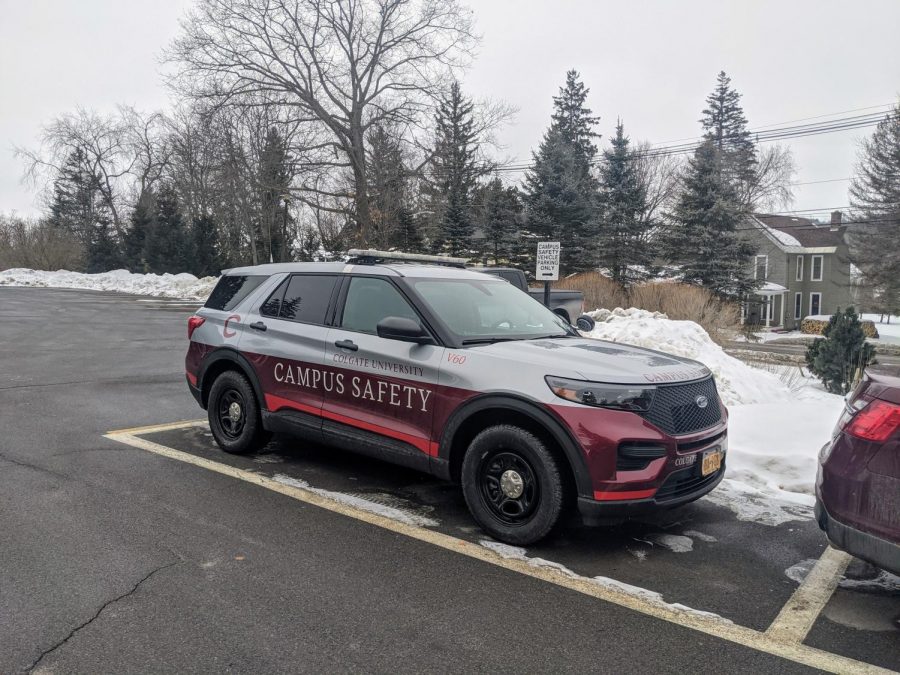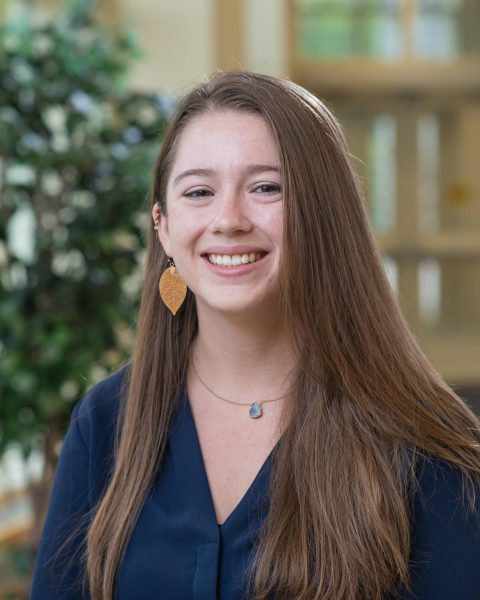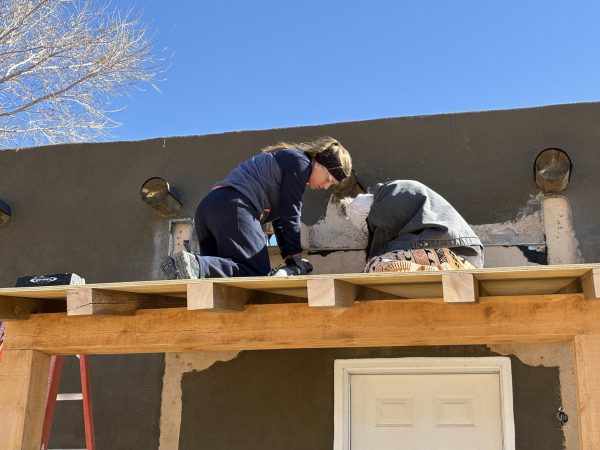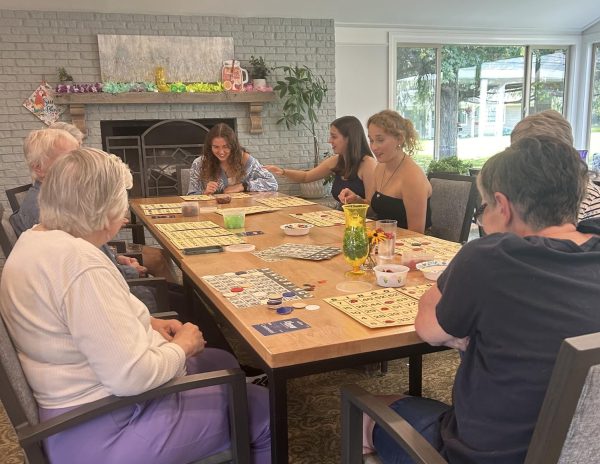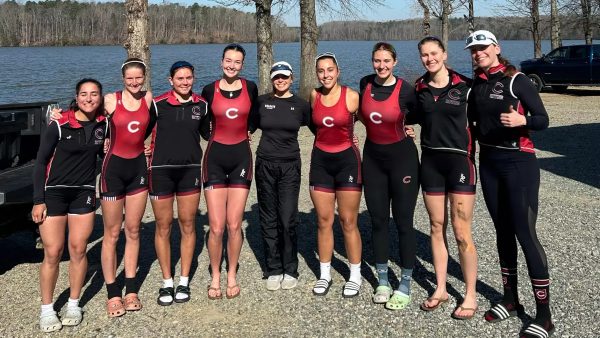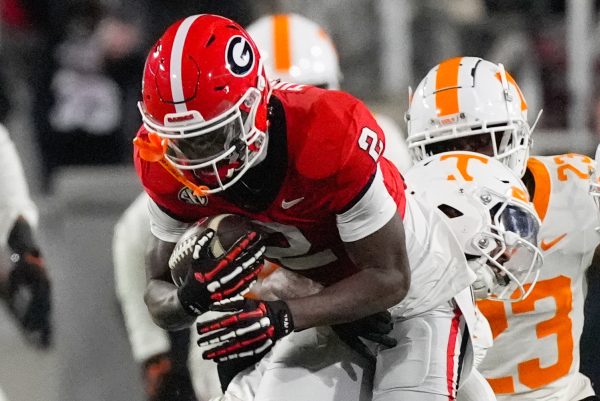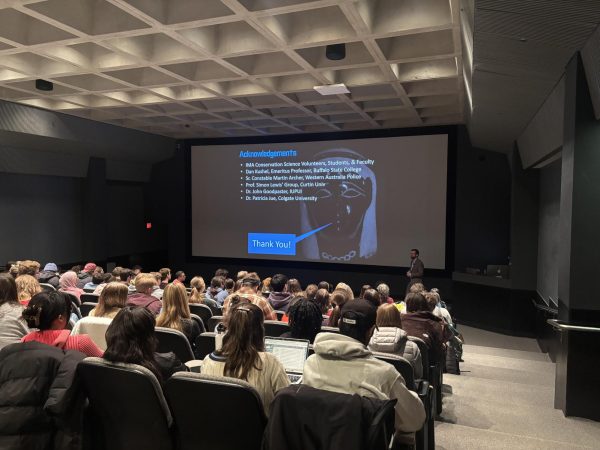Students Raise Concerns Over Discrepancies In Campus Safety Response To Affiliated Vs. Non-Affiliated Social Gatherings
Students allege a difference in Campus Safety interactions between affiliated and non-affiliated groups and individuals. Whereas students in Greek life organizations (GLOS) share that their relationship with Campus Safety is mostly positive, many unaffiliated students cite a poor or non -existent relationship which leads to the frequent shutting down of parties at cultural houses. Associate Vice President for Campus Safety, Emergency Management and Environmental Health and Safety Dan Gough said that the data Campus Safety has collected does not support the claim that there is “disproportionate treatment favoring [GLOS],” and encourages any student that feels they have been mistreated to reach out to him directly or to their dean.
Having been involved with La Casa since his first year at Colgate and serving as a social leader his junior year, senior Arturo Longoria credits most of his social life at Colgate to this cultural house. La Casa hosts all-inclusive and open gatherings, making it one of the few spaces on campus for non-affiliated students to socialize, according to Longoria.
“Non-affiliated parties get shut down [by Campus Safety] all the time. It’s very intricate but a super serious issue at Colgate since it does affect the social space of a big part of the student body,” Longoria said.
Senior Keelah Dixon says that similar to La Casa, parties at the Creative Arts House (CAH), another cultural house on campus, are shut down often.
“I have been to a significant number of parties at CAH in my three years (not counting this year due to COVID) but they have all been shut down, except for a couple,” Dixon said.
Both Longoria and Dixon relay that the constant shutting down of parties at La Casa and CAH negatively affects their social life and that of other students of color on campus.
“People don’t want to go to our parties because they’re going to get shut down. We have a lot of apathy from [people of color] on campus, and for me, I felt responsible to provide this space for everyone — for Hispanic people and for Latinos — but I can’t do anything about it,” Longoria said.
Longoria attributes the shutting down of parties at non-affiliated organizations to poor relationships with Campus Safety. Dixon also said she does not have a relationship with campus safety, making it difficult when they report to CAH.
“My [first-year], there were Greek Life people living in the house and it was really easy because they would talk to Campus Safety and know them more. My [first-year] and sophomore year, they had more parties because of that. Junior year, there were no Greek Life students in the house and that was the challenging part,” Longoria stated.
Dixon describes her overall experience with Campus Safety as negative, citing only one positive interaction with an officer during her time at Colgate.
“I have dealt with Campus Safety entering my living space without me knowing, following me and my (Black) teammates when driving on campus, screaming at me in front of my apartment-mates because I did not exit the building as quickly as they would have liked during a fire alarm. I can go on all day about this,” Dixon added.
When asked how often Campus Safety interacts with students at cultural houses, Campus Safety Officer Katilin Reich said Campus Safety officers don’t enter the houses often.
“I’m probably in the houses once a semester, if that. I don’t see them often on the social host sheet although I wish I could,” Reich said.
Former Vice President of Phi Delta Theta senior Billy Liptrot said he’s had, “mostly all positive interactions” with Campus Safety as a fraternity member, and along with Theta Chi senior Tommy Colman, specifically noted Sergeant/Shift Supervisor Kevin Alt.
“Sergeant Alt has a very good relationship with all of the fraternities. He gives out his phone number in case there is an emergency. He really values transparency and open dialogue so in the event that you call [Campus Safety] it’s easier to just directly contact Sergeant Alt,” Liptrot said.
Sergeant Alt confirmed that he aims to develop a friendly relationship with students. Regarding his relationship with both Greek-affiliated and non-affiliated students, Alt said he makes an effort to build relationships with students regardless of affiliation.
“I’m across the board with everyone, I’m a liaison with Greek Life, but I try to build a rapport with everyone,” Alt said.
Reich commented on there being a Campus Safety liaison for Greek Letter Organizations (GLOs), but not for cultural houses, saying she wasn’t sure why there isn’t a liaison for cultural houses.
“I’m not sure why they’re left out. There could be more officers that are liaisons, not just Kevin Alt. If you have an officer that you know, you feel more comfortable around them. That’s something we should work on to better our relationships with [cultural houses],” Reich said.
Gough elaborated on the process of training that Campus Safety officers offer organizations that host socially. He furthermore said he welcomes any opportunity to do more social hosting training.
“Upon request, Sergeant Alt meets with Greek chapters at the beginning of the year to provide additional training on the social hosting policy and related requirements. This training and additional guidance navigating the social hosting process is available to all student organizations upon request,” Gough said. “Leading up to the Fall 2020 semester, Campus Safety created an online request form to make requests of this nature more accessible to all campus community members. I encourage any interested student group to seek out Campus Safety to participate in one of these sessions.”
Senior Nik Rajavasireddy, former member of Delta Upsilon (DU), also said he feels his fraternities relationship with Campus Safety is positive.
“They are incredibly nice and usually make a conscious effort to get to know their members. At parties, they usually chit-chat with members during the walk through, talking about sports or how our days are going, basically a very cordial relationship and they are not at all intimidating,” Rajavasireddy said.
Reich verified this positive relationship between fraternities and Campus Safety.
“I feel we have a great relationship with the fraternities and even with the sororities as well. They always greet us at the door when we show up and escort us. They’re very respectful, always cooperate with us and are honest,” Reich said.
Members of both Phi Delta Theta and Theta Chi responded that their parties are shut down “not often” or “hardly ever.” Theta Chi Member and senior Chris Burke reflected on Campus Safety’s leniency with their GLO.
“[Campus Safety] usually lets us correct mistakes before they shut us down. Most officers work with us,” Burke said.
Rajavasireddy echoed Burke, recalling that he never experienced Campus Safety shutting down a party at Delta Upsilon.
“This is not saying that there have been no violations on the part of the frat, just that the Campus Safety officer who witnessed them would usually let things slide or give a blind eye,” Rajavasireddy said.
Liptrot and Rajavasireddy both said they have noticed a different in the treatment of affiliated and unaffiliated parties. Liptrot said he has attended non-Greek events and has witnessed the imbalance first hand and Rajavasireddy explained he finds this imbalance very problematic.
“I think this difference is partly due to the fact that [Campus Safety] has a far closer relationship with Greek organizations. In my opinion, this differentiated treatment is very problematic because it perpetuates a social hierarchy on campus in which five all-male organizations effectively have a monopoly on social events that occur on campus,” Rajavasireddy said.
Reich responded to this noted discrepancy in treatment of both Greek and non-Greek social events by students.
“We all have discretion here at Campus Safety and if it’s something small or minor we will correct it on the spot and allow them to continue their party. Something like alcohol or serving minors that are under 21, that’s something that we would address. I feel like we all should be on the same page here at Campus Safety and if there’s a violation then the party should be shut down. That’s how it’s supposed to be,” Reich said.
Despite the belief that non-GLO events are surveyed differently than GLO events, Gough shared data from their Computer Aided Dispatcher (CAD) that suggests otherwise.
“Data pertaining to social-hosting violations does not align with the assumption that Greek events are surveilled or enforced differently from non-GLO events. In fact, GLO social-hosting violations were triple that of non-GLO violations from 2017 to 2020. ” Gough said. “Additionally, several fraternities have received organizational sanctions during this time period, including one this past fall that led to temporary relocation of affiliated students from the chapter house for the spring 2021 semester, as a result of Campus Safety-led investigations involving Code of Student Conduct violations stemming from social hosting events.”
Longoria reflected on what became La Casa’s final party following being shut-down for “alcohol violations,” although they had not provided alcohol .
“[Campus safety] was taking pictures of trash cans with beers in it. I tried to tell them it’s not our alcohol, they’re coming from DU,” Longoria said.
When the party was shut down, Longoria went to Delta Upsilon just across the street, where another party hosted by the fraternity was taking place.
“DU had no consequences. I looked at a [Campus Safety] officer, he recognized me from our party, and said: ‘So you’re not gonna shut this down?’ They didn’t. At DU, the [Campus Safety] officers never even go inside. That moment for me was when I realized there was a difference in treatment of Greek life houses and cultural houses,” Longoria said.
Reich referenced the same party Longoria did when explaining why Campus Safety shuts certain parties down. She specifically referenced that some of these spaces are dry houses.
“I feel like we shut down parties more at places that are dry houses. I don’t want to blame [dry houses] entirely, I believe it’s more the people that are coming there that just bring alcohol off the streets. And it is hard to control when you have lots of people walking in and out of the building. I get that it is hard to control, but unfortunately if it’s a dry house and we see alcohol present then we have to shut the party down,” Reich said.
Reich suggested, however, that having a “better working relationship” with cultural houses would help “guide them on how to handle [certain] situations” at dry parties.
“You telling your fellow [classmate] ‘you can’t come into my house because you have alcohol’ puts [the host] in a weird spot as well, so if they’re comfortable enough to call us so we can handle that situation so that they don’t have to then the party [won’t] get shut down,” Reich said. “Social hosts are expected to know the rules. [Cultural house members] may have questions and be too afraid to ask, so if we go over it with them, reiterate what the rules are then they would be more comfortable.”
Still, Dixon spoke up about unfair treatment by Campus Safety on a deeper level.
“Students of color understand that we are subject to harsher treatment and punishment by Campus Safety, so even when parties [at CAH] had been registered, most students left and it ended. As a person of color, it is scary to be at any event that Campus Safety comes to, but is a polar opposite reality for non-POC students, especially those affiliated with Greek life,” Dixon said.
Reich was shocked and upset to hear of students’ discomfort with Campus Safety.
“We are here to make sure that everyone feels safe and feels comfortable and for somebody to feel uncomfortable just from our presence that does kind of disturb me and I feel like that’s something again that we would have to work on with the students to form a better relationship,” Reich said. “Comments like that never go unnoticed. We always address it.”
Gough also asked that students bring these incidents to his attention.
“Enforcement of campus policies and regulations should be uniform for all students. If a student believes they have been subject to unfair treatment or scrutiny, I would ask them to contact me directly, or to share their concerns with their dean so that the issue can be promptly investigated and addressed,” Gough said. “Our primary goal is to provide a safe and supportive environment for everyone at Colgate, regardless of their affiliation on campus.”
Longoria acknowledged that challenging the inequality of the social scene at Colgate does not simply fall on Campus Safety.
“A lot of the time they tell us ‘Why aren’t you reaching out to Greek life people or fraternities or sororities?’ And my question is, ‘Why aren’t you reaching out to us?’ If you truly want to dismantle the issues in the party scene or social scene at Colgate, have this conversation with those houses,” Longoria said.


